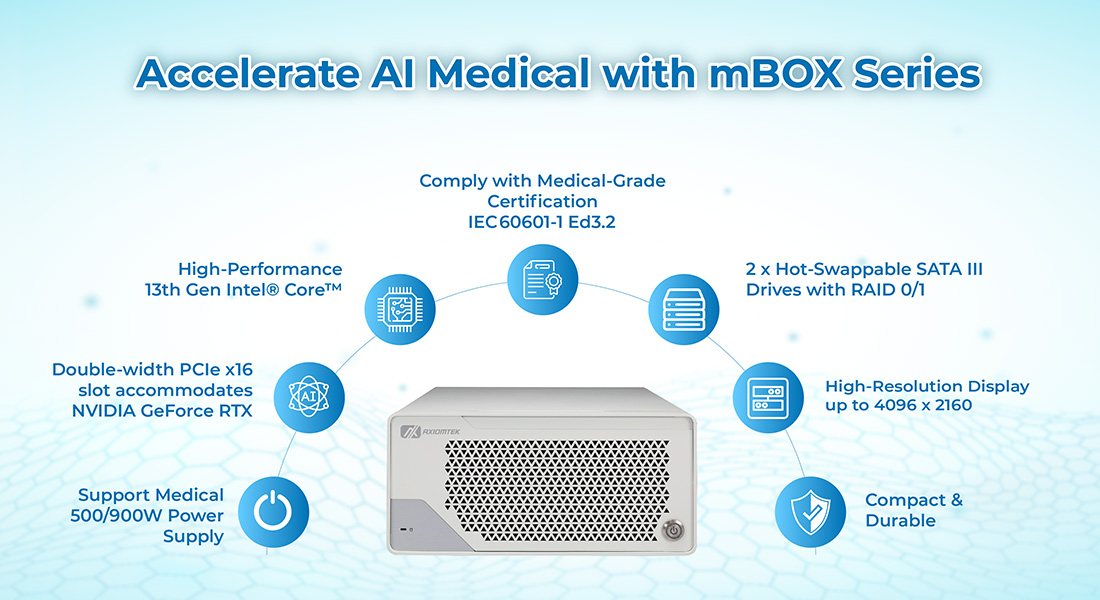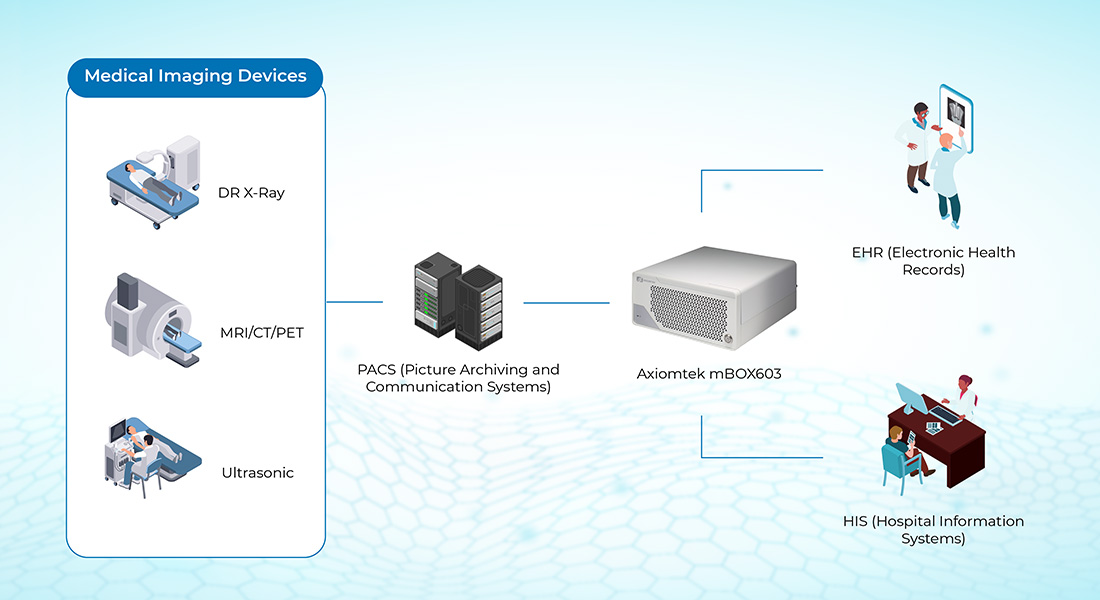AI imaging is revolutionizing the medical field by delivering unparalleled efficiency and ever-improving accuracy—essential qualities in a time when modern medical imaging procedures are increasing at an unprecedented rate. Technologies such as CT, MRI, ultrasound, and PET scans provide clinicians with highly detailed insights into the human body, enabling earlier and more precise disease detection. However, these advanced imaging techniques produce vast amounts of data per patient, creating an overwhelming workload for doctors and radiologists. Managing and analyzing these volumes manually is not only impractical but also risks missing subtle patterns critical for diagnosis.
With the advancement of AI algorithms and imaging technologies, systems can now efficiently collect, process, and analyze medical images, significantly enhancing the detection of diseases and identification of illnesses. Recognizing the need for robust and reliable solutions, Axiomtek has developed a series of cutting-edge medical computing systems that are fully compliant with stringent medical-grade certifications. Through close collaboration with healthcare application providers, Axiomtek continues to drive innovation in medical imaging technology, ensuring it meets the evolving demands of modern medicine.

Challenges of AI Imaging: Hardware Limitations
While AI imaging promises transformative advancements in the medical field, its deployment presents significant challenges, particularly in terms of hardware requirements. AI algorithms require substantial computational power to process and analyze high-resolution images from imaging devices. Furthermore, the research shows a single CT scan can generate over 500 images totaling around 50 MB in data size. With millions of scans taken yearly across hospitals and diagnostic centers, accumulating imaging archives have swelled to petabytes of data. To ensure the accuracy of diagnostic information and avoid misdiagnoses that could compromise patient safety, it is necessary to maintain stable operations in sensitive medical environments. This makes systems with stringent regulatory standards indispensable.
Addressing Challenges with Axiomtek’s mBOX603
Axiomtek’s mBOX603 is purpose-built to address hardware challenges in medical AI imaging. Its advanced features make it a reliable solution for overcoming the performance and integration issues healthcare providers face. Key advantages include:
High-Performance Computing: Powered by a 13th Gen Intel® Core™ processor and supporting up to 64GB of DDR4 memory, the mBOX603 delivers exceptional computational capability to handle AI-intensive tasks.
GPU and Expansion Support: Dual PCIe x16 expansion slots enable compatibility with specialized GPUs and capture cards, such as NVIDIA RTX series, essential for running complex AI models and processing large image datasets.
Storage Expansion: Equipped with two 2.5" hot-swappable SATA III drives with RAID 0/1 support and an M.2 Key M 2280 NVMe SSD slot, the mBOX603 provides scalable, high-speed storage for managing and archiving massive medical imaging datasets.
Medical-Grade Certifications: Fully compliant with IEC 60601-1 standards which ensure the mBOX603 meets stringent requirements for electrical safety, electromagnetic compatibility (EMC), and continuous operation, reducing risks in high-stakes healthcare settings. It also guarantees that the mBOX603 does not interfere with other critical equipment in the medical environment, including operating rooms.
Fast & Stable High-Resolution Display: Featuring dual HDMI 1.4b ports (4096 x 2160 @30Hz) and one DisplayPort++ 1.2 (4096 x 2160 @60Hz), the mBOX603 ensures smooth, high-resolution visuals for real-time image rendering and analysis, crucial for medical imaging applications.
Versatile Connectivity: Equipped with two 2.5GbE LAN ports, four USB 3.2 ports, and two COM ports, the system seamlessly integrates with existing imaging and hospital infrastructure.
Wireless Connectivity: The mBOX603 offers a range of wireless connectivity options, including 5G/4G/LTE via an M.2 Key B 3042/3052 slot and seamless Wi-Fi connectivity through an M.2 Key E 2230 slot. It also features two SMA-type antenna connectors.
Compact and Durable Design: The mBOX603's compact form factor and robust build allow easy deployment in various medical settings, maintaining stable performance under demanding conditions. In addition, it is designed for longevity, ensuring a long lifecycle for hospital use.

Integration Across the AI Imaging Ecosystem
The mBOX603 seamlessly fits into the medical AI imaging ecosystem, serving as a critical bridge between image-generating devices and hospital information systems. Positioned between imaging modalities like CT, MRI, and PET scans, and backend systems such as PACS (Picture Archiving and Communication Systems), HIS (Hospital Information Systems), and EHR (Electronic Health Records), the mBOX603 ensures efficient data processing and transfer. By supporting advanced AI applications and facilitating interoperability, the mBOX603 empowers hospitals to streamline their workflows, reduce diagnostic timeframes, and enhance patient care.


